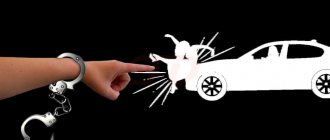The legislation clearly interprets the onset of liability depending on the damage caused. According to the current law of the Russian Federation, if the amount of damage caused is less than one thousand rubles, administrative prosecution comes into force, if more, criminal prosecution. A person who has committed an offense wonders at what amount criminal liability arises and how serious the punishment will be.
Register now and get a free consultation from Specialists
In addition to the amount of damage, there are a number of circumstances that influence the choice of punishment (from a fine to imprisonment of the offender). The following circumstances included in the crime can determine the amount of damage at which criminal liability occurs:
— Presence of malicious intent;
— Collusion;
— Obvious encroachment on property;
Otherwise, a fine is provided as an administrative penalty. Another significant factor in the concept of “criminal liability” and determining the amount of damage is the age category of the offender. Judicial practice in relation to minors occurs in a separately established manner.
Liability for theft
The law in the Russian Federation provides for two types of liability for theft of property that is the property of a third party:
- criminal (regulated by Article 158 of the Criminal Code of the Russian Federation);
- administrative (enshrined in Article 7.27 of the Code of Administrative Offenses of the Russian Federation).
Responsibility for this act can be imposed on an individual over the age of 14 years. When deciding what consequences the act committed may entail for the offender, it is necessary to start from the value of the stolen property.
Petty theft: what is the punishment for them?
The legislator transferred the theft of property valued at less than 2.5 thousand rubles to the category of minor offenses. Responsibility for them is enshrined in the Code of Administrative Offenses of the Russian Federation (Article 7.27). The violator will be able to get off with just a fine if the following conditions are met:
- there are no circumstances aggravating the guilt of the attacker;
- the act was committed by him for the first time.
Theft of someone else's property valued at 1 thousand rubles or less is considered petty theft. The subject of this offense may face:
- a fine equal to five times the value of the stolen property;
- compulsory work within a 50-hour period;
- arrest, the longest period of which is 15 days.
Part 2 Art. 7.27 of the Code of Administrative Offenses of the Russian Federation states that theft of property, the price of which is in the range from 1 to 2.5 thousand rubles, is punished more severely and may entail the following sanctions:
- a fine, the amount of which varies from 3 thousand rubles to five times the price of the stolen property;
- arrest for 10-15 days;
- compulsory work, the longest duration of which can be 120 hours.
If the value of the property stolen by the thief turns out to be above the threshold of 2.5 thousand rubles, the attacker will not be able to get away with just an administrative protocol.
Example: A person secretly took products worth 2.8 thousand rubles from a supermarket. Despite the fact that the amount of damage did not reach 5 thousand rubles, the main signs of theft were evident, namely the presence of selfish goals on the part of the criminal and secrecy in carrying out the act. In this regard, the culprit was sentenced under Part 1 of Art. 158 of the Criminal Code of the Russian Federation.
Important! If the value of the stolen property does not reach 2.5 thousand rubles, an administrative case will be opened. But in a situation where the theft is committed again, the amount of damage will no longer matter - such an unlawful act is the subject of criminal proceedings.
In accordance with the explanations of the Supreme Court of the Russian Federation, the value of the object of encroachment is determined by the cost of acquisition by the owner at the time the crime was committed.
Retail, market or commission prices are taken into account. If it is impossible to establish a price, then an examination is appointed.
If we talk about responsibility and punishment for petty theft in stores, then it occurs only when the guilty person has left its borders and he has the opportunity to dispose of the stolen item.
If such a person was detained within the store, then his actions are qualified as attempted petty theft.
In cases of petty theft in stores, the administration does not always resort to the help of the police. Often, attackers are released without sanctions for stolen items or products.
The statute of limitations in this case is 2 months , i.e. a ruling on this offense cannot be made after the expiration of the specified period. For cases considered by a judge, this period is 3 months.
At what amount does criminal liability begin - lawyer Kristina Shekina comments
How to avoid going to jail if you don’t have money to pay off your loan?
First of all, notify the lender in advance that there is no money to pay off the loan debts. If you have lost your job, take a 2-NDFL certificate or from the labor exchange. This will be proof that you are making contact with the lender and are not shying away from fulfilling financial obligations. When the case is considered in court, you will no longer be able to be held criminally liable, since you notified the creditor in advance about the loss of your job.
It is not profitable for the bank for the case to drag on and end up in court. The bank’s task is to return the money with interest, so if the debtor makes contact, he will be given several options for solving the problem.
Credit holidays. If you have temporarily lost your job and financial difficulties are temporary, take advantage of credit holidays. Under credit holidays, the debtor is given a deferment from repaying the debt for up to a year. But many Russian banks provide credit holidays to customers for up to six months. In this case, the bank does not charge penalties and fines, and the client begins to pay debts after six months.
Refinancing. Another option for getting rid of loan debt is refinancing. Suitable for those who want to reduce the amount of monthly payments. Thanks to refinancing, it is possible to reduce the interest rate, which ultimately reduces the amount of overpayment. For example, we took out a loan from VTB at 15% per annum, but could not cope with the financial burden. We saw that Sberbank offers refinancing at a rate of 9% per annum. Submit an application for refinancing to Sberbank and receive VTB’s consent. Please note that for refinancing you must not allow late payments, otherwise you will receive a refusal.
Bankruptcy. When you have absolutely no money and no work to pay off the loan, and you live in a single one-room apartment, you should think about the bankruptcy procedure. If the amount of debt exceeds 500 thousand rubles. The bankruptcy procedure will follow the standard procedure. You will be prohibited from holding leadership positions, and all income will be controlled by bailiffs. If bank accounts, deposits, deposits and securities are found, they will be seized to pay off the debt. You should think about bankruptcy as a last resort, when you are sure that you will not find the money to pay off the creditor.
Read the article “How to get out of microfinance debts with maximum interest?”
What liability follows for theft if the stolen property costs more than 5 thousand rubles
Part 2 of Art. 158 of the Criminal Code of the Russian Federation establishes sanctions for the above crime if the price of stolen items is more than 5 thousand, but less than 250 thousand rubles. The offender may be subject to the following punishment options:
- a fine of up to 200 thousand rubles, or equal to the income of the culprit for a period of up to 1.5 years;
- involvement in compulsory, corrective or forced labor (lasting 480 hours, 2 years, 5 years, respectively);
- imprisonment for up to 5 years;
- In addition to forced labor and imprisonment, a year of restriction of freedom may be applied.
If the damage is estimated at between 250 thousand rubles and 1 million rubles, the culprit will be held liable under Part 3 of the same article and may be subject to:
- a fine of up to half a million rubles, or equivalent to the income of the subject of the crime for a three-year period;
- involvement in forced labor for up to five years, which the court may supplement with restriction of freedom for a period of up to 1.5 years;
- imprisonment for up to 6 years (in addition to this, they may be sentenced to a fine (not more than 80 thousand rubles) or restriction of freedom for 1.5 years).
Punishment for theft, provided that the value of the stolen property is 1 million rubles or more, is enshrined in Part 4 of the article in question. The perpetrator of this act can expect up to 10 years in prison, as well as a fine (in the amount of up to 1 million rubles or five years’ income of the perpetrator of the crime) or restriction of freedom for a two-year period.
What does decriminalization of petty thefts up to 5,000 rubles mean?
When does criminal liability occur?
Theft is one of the most common crimes committed in the country. This is the theft of valuables from citizens in public transport, on the street, in supermarkets. Very often the total amount stolen does not even exceed 1000 - 1500 rubles.
- According to the adopted laws, the amount of stolen goods is 2500 rubles. is not considered a reason to open a criminal case after changes in legislation in 2016. If the theft was committed for the first time, then administrative liability is threatened. But there are exceptions, for example, fraud of legal entities or individual entrepreneurs.
- The value of the stolen goods is determined by experts or based on the average purchase price. It happens that the final amounts have strong discrepancies, so another, third, independent appraiser of the stolen item is often invited.
- The problem is that many underage teenagers calmly commit crimes, believing that due to their young age they are not threatened with any punishment, and they have no responsibility.
- This statement is wrong. And not only children, but also parents who know about the actions of their offspring need to know about this. We turn to Parts 1 – 2.3 of the Code of Administrative Offenses of the Russian Federation and Parts 1 – 20 of the Criminal Code of the Russian Federation. It states that if you are 16 years old, you will have to answer, since there are administrative and criminal liability.
- After the adoption of bill 771893 6, criminal liability is applied only when the amount of the stolen goods is equal to 5,000 rubles. minimum.
Classification of damage (for 2022)
We take the data from Art. 158 of the Criminal Code of the Russian Federation.
- Significant - from 5000 rubles. But different circumstances are taken into account and investigated. These include the financial situation of the “victim” of the crime.
- Large - more than 250,000 rubles.
- Particularly large sizes - RUB 1,000,000. and more.
Types of liability (theft from 5,000 rubles)
- Fine from 80,000 to 200 thousand rubles. (the alternative is a fine equal to the salary or other income of the accused for 18 months).
- Mandatory work - 360 - 480 hours.
- Correctional labor from 1 year to 2 years.
- Serving a sentence in MLS from 2 to 10 years.
Attention: if a fine is imposed after theft of 5,000 rubles or more, then it is equal to no less than 5 times the amount of damage caused.
Assessment of damage when liability becomes criminal
The legislation of the Russian Federation enshrines several offenses that are confusingly similar. These are, for example, Art. 7.27 Code of Administrative Offenses of the Russian Federation (petty theft) and Art. 158 of the Criminal Code (theft). To qualify an offense as a criminal offense, the amount of damage is of decisive importance.
In Chapter 21 of the Criminal Code of the Russian Federation you can find a definition of the concepts “significant damage”, “major damage”, “especially large damage”. The difference between them is the amount of money stolen.
In the notes to Art. 158 of the Criminal Code of the Russian Federation contains a classification of types of damage depending on its magnitude, which affects the qualification of the crime.
- Significant damage caused to a citizen implies the theft of property worth more than 5 thousand rubles. The presence of a sign of significance is determined by assessing the financial situation of the victim (that is, the harm must be significant for this person). But the minimum amount of damage required to initiate a criminal case is, in any case, 5 thousand rubles.
- Major damage involves theft of property worth more than 250 thousand rubles.
- Particularly large damage is characterized by cases of theft in the amount of 1 million rubles.
Criminal liability and amount of damage
The experience of applying existing legislation shows when damage results in criminal liability and when administrative liability.
The practical application of the criminal code occurs if:
— the monetary equivalent of the damage is 250 thousand rubles or more;
— the offense was committed with a negative social connotation;
- the crime was carefully prepared in advance;
— several people were involved in the offense;
— other aggravating circumstances;
For minors, a criminal sentence can be replaced by sending them to special schools. In especially severe cases, the teenager is placed in a juvenile correctional facility. Minor damage is assessed based on the totality of the public danger and the amount of stolen property. In each specific case, the court will consider in detail the circumstances arising in the case before making a decision.
Circumstances that aggravate liability
Theft will be regarded as a criminal offense for any amount of damage if the presence of one of the following circumstances is confirmed, the list of which is enshrined in parts 2-4 of Art. 158 of the Criminal Code of the Russian Federation:
- it was committed by a group of persons by prior conspiracy;
- the theft was carried out by an organized criminal group;
- the act was committed by entering a residential or other premises;
- there was theft from a pocket/bag (pickpocketing);
- theft of funds was committed from bank accounts or cards;
- the criminal committed theft from gas or oil pipelines;
- the person has previously committed a similar offense.
Important! Even with the most insignificant damage (less than a thousand rubles), the presence of only one of the listed circumstances is sufficient for the offender to bear criminal liability.
Aggravating circumstances in case of theft are considered when the theft is committed under the influence of ethnic hostility or religious hatred, as well as in the form of revenge.
Increases liability for a crime if the theft was committed against a pregnant woman, and the offender knew about the pregnancy. Theft against minors or persons dependent on the offender is also considered aggravating circumstances.
Aggravating circumstances include the use of official position, various false documents or special uniforms to gain trust and then commit theft.
Cases when you can avoid punishment
In 2016, a new version of the Criminal Code of the Russian Federation was adopted, which determined the special status of violators who compensated for damage before the start of prosecution in a criminal case.
The peculiarities of the situation of such persons are provided for in Art. 76.1 of the Criminal Code of the Russian Federation as amended on July 3, 2016. This article allows for the possibility of exemption from liability for criminal offenses in the field of taxation if the offender compensates the state for the amount of damage caused.
Part 2 Art. 76.1 of the Criminal Code of the Russian Federation reveals the conditions for release from liability if the offender has made amends for the harm caused before the initiation of the case.
The changes made in 2016 provide a chance to release a person from criminal liability in the presence of a set of the following circumstances:
- the criminal act was committed by this person for the first time;
- the culprit fully compensated for the damage caused to another citizen, legal entity, or state;
- the criminal transferred to the budget an amount equivalent to the cost of damage twice as much;
- the committed act falls under Part 2 of Art. 76.1 of the Criminal Code of the Russian Federation (it contains references to specific crimes provided for by the Code).
Thus, the legislator assumes that a first-time violation may be the result of a mistake or delusion, so the state seems to forgive the offender for such an act. The result is the release of the offender from criminal liability, which will entail the absence of a criminal record and other unpleasant consequences (for example, the need to constantly visit government agencies and courts).
Important! Reconciliation of the parties is possible in the event of a crime of minor or medium gravity, which covers only the first 2 parts of Art. 158 of the Criminal Code of the Russian Federation. In other cases, the violator will be held accountable under the Criminal Code of the Russian Federation.
List of types of compensation for damage caused by a crime (Article 1082 of the Civil Code of the Russian Federation):
- Compensation in kind, i.e. return or replacement of the victim's property damaged or destroyed as a result of the crime. It must be of the same quality, purpose and correspond to the cost of the original item.
- Full reimbursement of expenses incurred by victims to restore their property or lost rights.
- Compensation for lost income that the injured party would have received if the crime had not been committed.
Liability of minors
In accordance with the law, liability for theft occurs upon reaching the age of 14. At the same time, the teenager who committed the theft, who is 11 years old, is sent to a special closed educational institution.
In any case, for criminals under 16 years of age, provided for in Art. 158 of the Criminal Code of the Russian Federation, a sanction in the form of imprisonment is not applied. A person who has already turned 16 may be placed in a juvenile facility. However, in criminal practice such punishment is prescribed only to repeat offenders. When committing theft for the first time, a minor, as a rule, is not punished so severely and can count on the application of more lenient sanctions (for example, a fine).
Important! If a minor commits petty theft but is under 14 years of age, parents or legal representatives face liability.
Most often, they are forced to pay a fine, the amount of which is determined depending on the type of act and its severity. If the parents manage to reconcile with the other party, damages can be paid.
If the theft was committed by a teenager aged 14-16 (including by conspiracy as part of a group), the parents will also have to pay a fine for an administrative offense.
Theft committed by a minor falls under Art. 158 of the Criminal Code of the Russian Federation. Punishment under it can be received from the age of fourteen. However, the law makes allowances for age: the norms that are noted in Art. 88 of the Criminal Code of the Russian Federation, which outlines the penalties applied to children. This:
- fine. In some cases, guardians or parents must pay an administrative fine. The amount can be from one to fifty thousand rubles. In addition, the punishment may consist of confiscation of the thief’s income for a period of 2 weeks to six months;
- deprivation of the right to work;
- compulsory work (40-160 hours). Work is provided solely to the strength of the teenager. Persons 14-15 years old can practice them no more than 2 hours a day. Teenagers 15-16 years old perform work no more than 3 hours a day and only during the period when they do not attend school or vocational school;
- correctional labor for up to 1 year;
- restriction of freedom from 2 months to 2 years;
- imprisonment does not apply to children aged 14-16 who have violated the law for the first time. A serious violation can be punished by imprisonment for a term of no more than six years, and a particularly serious one - no more than ten years. He will have to serve his sentence in a correctional colony.
Features of the responsibility of a 15-year-old teenager
Fifteen-year-olds who commit theft are subject to all the administrative measures described above; they may also be required to compensate for material damage if the child has his own income. In this case, the amount of damage should not exceed half the amount of the minimum wage in the country.
Amount of criminal liability for minors
To answer the question of the amount of criminal liability for persons under 14 years of age, it is necessary to refer to Article 87 of the Criminal Code, which spells out the concept of “minor” and the possibility of applying criminal punishment to him. Criminal punishment for persons under 14 years of age does not depend on the amount of damage, but on the requirements of the law in relation to this category of citizens. The general minimum age of criminal responsibility is set at 16 years. However, in Part 2 of Art. 20 of the Criminal Code of the Russian Federation lists the elements of crimes according to which persons under 14 years of age bear criminal liability, these are:
1) crimes related to physical violence;
2) taking possession of someone else's property;
3) destruction or damage to property;
4) kidnapping, hostage taking, terrorist attack.
The age-related characteristics of adolescence determine such measures of punishment in which the emphasis shifts from the punitive function to the educational one. According to Art. 96 of the Criminal Code of the Russian Federation, the amount for criminal liability for persons under 14 years of age is established by current legislation, it is paid by parents or guardians.
Register now and get a free consultation from Specialists
Thefts committed on the Internet
In this area, you most often encounter theft of funds from bank accounts and cards. The difference between thefts via the Internet is that they are usually closely related to another element - fraud.
If the criminal simply hacked into a bank account, then this will be regarded as theft. However, if he got to the victim’s card or account as a result of the latter’s deception, such an act will be considered fraud.
It should be noted that the theft of funds from accounts or payment cards in accordance with criminal regulations is an aggravating circumstance, in any case entailing criminal prosecution. In this case, the size of the assigned amount does not matter.
Special rules for fraud
The Criminal Code of the Russian Federation contains special rules for establishing the amount of damage caused for certain elements of fraud provided for in Articles 159 (parts 5 to 7), 159.1, 159.3, 159.5, 159.6.
The article was approved by practicing lawyer, blog expert, Christina Shekina
In relation to these compounds, the amount of damage and the rules for calculating it differ from the general procedure described earlier. For these crimes, a significant amount of damage is estimated by criminal law at an amount of 10 thousand rubles, large - from 3 million rubles, especially large - from 12 million rubles.
Such a significant amount of damage is established by the legislator for initiating a criminal case due to the fact that the parties to the relationship are business entities (individual entrepreneurs or organizations).
All property and material assets of the enterprise are subject to reflection in accounting documents. If any things, objects, products or raw materials are not capitalized and registered, it will be almost impossible to prove their theft (for example, if an organization hides property or understates production volumes to reduce taxes).
It must be taken into account that for almost any property produced or acquired by an enterprise, the initial cost indicators are lost over time. This is due to its use, resulting in natural physical wear and tear. Depreciation indicators are recorded annually in accounting information and will be taken into account when calculating damage from theft.
What consequences await the loan debtor?
If the borrower does not fulfill financial obligations to the bank, managers will immediately call and clarify the reason. Defaulters are warned of penalties and accumulation of debt. If this does not help, the bank will go to court or sell the debt to collectors.
When it comes to court, banks often win their cases. As a result, the debtor will still be forced to repay the debts. If you have no money or have lost your job, your property will be seized. Bailiffs will take an inventory of property and valuables and estimate the value.
The only housing in Russia is prohibited by law from being taken away. But this rule does not apply to luxury apartments. There have already been cases in judicial practice when a debtor tried to declare himself bankrupt while owning a five-room apartment. As a result, the property was sold, and part of the money was taken to pay off the debt.
Features of determining the amount of damage caused
The rules for calculating the amount of damage are contained in the Resolution of the Plenum of the Armed Forces of the Russian Federation “On judicial practice in cases of theft, robbery and robbery”, as well as in a number of other documents. The main provisions are as follows:
- The amount of damage is determined based on the actual value of the stolen property on the day the act was committed.
- The amount of compensation to the victim is calculated based on the value of the property appropriated by the criminal at the time the decision on compensation for harm is made. In this case, it is possible to index it as of the date of execution of the decision.
- If there is no data on the price of stolen property on the day the crime was committed, it is necessary to conduct an appropriate examination. The result will be an expert opinion, on the basis of which the value of the stolen property will be determined.
- There is a special procedure for determining the value of things that have special historical, scientific, or artistic value. To do this, it is necessary to draw up an expert report, which will establish the value of the stolen property in monetary terms, as well as its scientific, cultural or historical significance.
- In case of disagreement regarding the price of stolen property, participants in criminal proceedings can also invite an expert from an independent organization. The main thing is to decide who will be responsible for paying for his services.
Important! The amount of compensation due to the victim is calculated taking into account the indexation of the value of lost property on the date of execution of the sentence.
What does the bank do before the trial?
Before the case goes to court, it takes several months to a year before the bank management decides to collect the debt in this way. While the borrower does not pay the money, the bank can do the following.
- Sells the debt to a collection agency. Collectors will constantly call the debtor and ask about repayment of the debt.
- The bank transmits the information to the BKI and blacklists the borrower. As a result, you will not be able to get a second loan anywhere.
- Bank representatives can call the debtor themselves and offer a way out of the financial situation.
If these measures do not help, the case is taken to court and the borrower is forced to pay the debts after a decision is made. But if the debtor really does not have the money to fulfill his obligations, he can file for bankruptcy.
A bankruptcy case is considered under a simplified procedure if the amount of debt does not exceed 500 thousand rubles. The entire process of declaring a debtor bankrupt takes no more than six months, and documents are submitted through the MFC.
Example from judicial practice No. 1
Previously convicted citizen N., unemployed, abusing alcoholic beverages, committed open theft of someone else's property.
Having seen a large bright package in the supermarket, the attacker brought it closer to the exit. Seizing the moment when the guard switched his attention, the intruder took the package out of the store.
The security guard reacted in time and detained the criminal on the street, after which he called the police.
Initially, based on witness testimony and other circumstances of the case, the unlawful act was classified as robbery.
However, during the judicial investigation, the classification of the offense was changed to attempted robbery, and the attacker was charged with responsibility for an unfinished crime. This was done as a result of assessing the contents of a stolen package, which contained a children's insulated blanket worth 700 rubles.
The culprit confirmed that he had no intention of stealing the blanket. He was mistaken in thinking that the package contained something more valuable.
At the same time, since citizen N. had previously committed similar acts, the change in the crime did not lead to significant improvements in the situation of the convicted person: he was imprisoned for a period of 1 year and 6 months.
Example from judicial practice No. 2
Brothers M.V. and I.V., having entered the farm at night, tied up the watchman and slaughtered the bull. Having cut the carcass into pieces, the attackers took it with them. In the morning, farm workers freed the bound guard.
The watchman said that he did not resist because the criminals had an ax and a knife. Although the culprits were exposed quickly enough, they continued to deny their guilt. As a result, they admitted to their crime and explained that they committed the crime due to unemployment and difficult financial situation. Regarding the ax and knife, the brothers explained that they intended to use these tools for slaughtering a steer, and not as weapons.
The court considered their arguments justified, and therefore they were prosecuted for robbery, not banditry. The punishment was 2 years in prison.
As evidenced by extensive practice, robberies have a number of common features: a selfish motive, impudence, and sometimes aggressiveness.
Questions and answers
Question: What should those who are convicted and serving a sentence do if the amount of damage in the criminal law changes?
Answer: In such a situation, the phenomenon of decriminalization takes place. According to Art. 10 of the Criminal Code of the Russian Federation, a law mitigating punishment or exempting from it has retroactive effect. Based on this rule, convicted persons can apply for release from punishment or for its mitigation. This request is submitted by the convicted person in writing to the court at the place where the sentence is served.
Question: How long can you be imprisoned for petty theft?
Answer: This is considered theft when property is stolen with a value of no more than 2.5 thousand rubles. The most common is petty theft of products in hypermarkets.
The value of stolen products is determined based on its average market price.
Important! The amount of damage is equal to the purchase price of the goods, while the markup of the retail outlet is not taken into account. Determining the value of the stolen property is necessary to qualify the committed act.
Question: What can happen to a person who steals property worth less than 2.5 thousand rubles?
Answer: Such a violation is characterized as administrative, and the sanction for its commission is contained in Art. 7.27 Code of Administrative Offenses of the Russian Federation. The culprit is charged a fine, the amount of which varies from 1 thousand rubles to five times the price of the goods. The violator may also face administrative arrest or correctional labor. If a teenager under 16 years of age commits petty theft, a fine will be collected from his parents.
From all of the above, we can conclude that each theft has its own unique characteristics that influence the qualification of the act. Any crime has its own motives and characteristics of its commission that distinguish it from other similar violations. Therefore, it is impossible to accurately predict what kind of punishment will be imposed for theft.
Damage assessment
Assessing moral damages in case of loss of property is a complex procedure, but since material property has its own value, the amount for criminal damage can be the total damage of the stolen property. In case of sophisticated methods of appropriating someone else’s property and the amount of stolen property (from 1 thousand rubles), criminal practice is used. If the damage caused is small, without negative public connotations, administrative leverage is applied in the form of a fine. There are no penalties for capping damages. The analysis shows the key likelihood of applying the criminal code in case of large-scale damage. The administrative and civil codes deal with cases of minor damage without public overtones.
For consultations, you need to contact our Specialists.







